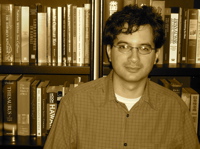Grading and Educational Philosophy
It is late, so I probably should not post any of my thoughts from this hour, but I am in the mood to write this random collage of what is on my mind as I listen to the rain outside.
It is around 2 AM now; I took a nap earlier. I am taking a brief break from correcting papers. I actually enjoy reading student papers. I don't even mind making lots of comments in order to try to help students become better writers. I hope that my students understand that. Most seem to, but I am surprised when a few don't pick up their papers from "the box."
On the other hand, I really do not like giving grades though. I want to reward students for doing well, and for their thoughts, but it is hard to evaluate learning and growth. Assignments that are easy to evaluate are not always the best learning experiences. Is it fair to always reward students who start classes with more knowledge and are gifted writers unlike someone who might have learned more in the class and worked harder. I struggle with this since grading forces me to make decisions.
One of my friends went to Antioch College, which does not give grades. I wonder how that works as an experience. It's truly exciting to think of motivating students to learn rather than having to use the power of grades. She told me that students could easily form a group and explain their interest in a certain topic. The professor would then work WITH the students to create meaningful educational experiences. The school also has a lot of internships, so one can balance theory and real-world learning.
I am probably thinking about this since I was trying to find more about Temple University Japan. Some friends and websites emphasized the school's small class sizes, collegial atmosphere, internships, etc. This is far from my image of colleges in Japan, and I suppose reflects why Americans established foreign schools there in the Bubble years. Another Japanese friend was more critical. I am curious to learn more. It is surreal to imagine foreign universities setting themself up in your country, although there are a few Japanese universities in the US, such as Tokai in Honolulu, but these seem mostly to attract Japanese wanting to go abraod.
Tomorrow, Noriko and I will have dinner (tofu tempura!) with a visiting Japanese Professor Wada Atsuhiko of Shinshu University (on sabbatical at Columbia University). He is doing some interesting research on Nikkei reading. He was one of a few people who've e-mailed me while reading my dissertation. It is a good feeling after putting so much work into it. I will have to take a look at his new book on Japanese literature and reading. I wish it was translated. Without having read anything, it sounds a bit like the writings of Nagamine Shigetoshi and Maeda Ai.
Well, I should get some sleep.
It is around 2 AM now; I took a nap earlier. I am taking a brief break from correcting papers. I actually enjoy reading student papers. I don't even mind making lots of comments in order to try to help students become better writers. I hope that my students understand that. Most seem to, but I am surprised when a few don't pick up their papers from "the box."
On the other hand, I really do not like giving grades though. I want to reward students for doing well, and for their thoughts, but it is hard to evaluate learning and growth. Assignments that are easy to evaluate are not always the best learning experiences. Is it fair to always reward students who start classes with more knowledge and are gifted writers unlike someone who might have learned more in the class and worked harder. I struggle with this since grading forces me to make decisions.
One of my friends went to Antioch College, which does not give grades. I wonder how that works as an experience. It's truly exciting to think of motivating students to learn rather than having to use the power of grades. She told me that students could easily form a group and explain their interest in a certain topic. The professor would then work WITH the students to create meaningful educational experiences. The school also has a lot of internships, so one can balance theory and real-world learning.
I am probably thinking about this since I was trying to find more about Temple University Japan. Some friends and websites emphasized the school's small class sizes, collegial atmosphere, internships, etc. This is far from my image of colleges in Japan, and I suppose reflects why Americans established foreign schools there in the Bubble years. Another Japanese friend was more critical. I am curious to learn more. It is surreal to imagine foreign universities setting themself up in your country, although there are a few Japanese universities in the US, such as Tokai in Honolulu, but these seem mostly to attract Japanese wanting to go abraod.
Tomorrow, Noriko and I will have dinner (tofu tempura!) with a visiting Japanese Professor Wada Atsuhiko of Shinshu University (on sabbatical at Columbia University). He is doing some interesting research on Nikkei reading. He was one of a few people who've e-mailed me while reading my dissertation. It is a good feeling after putting so much work into it. I will have to take a look at his new book on Japanese literature and reading. I wish it was translated. Without having read anything, it sounds a bit like the writings of Nagamine Shigetoshi and Maeda Ai.
Well, I should get some sleep.

